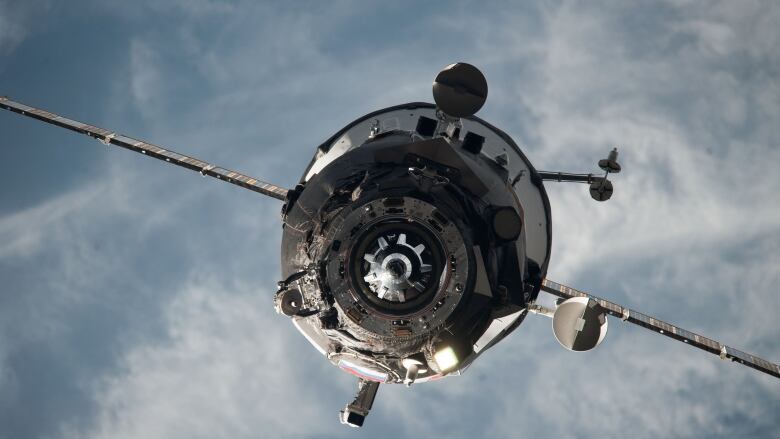Russian spacecraft unresponsive, spinning out of control
Docking at space station postponed until after Thursday

A Russian cargo ship was spinningout of control shortly after launch on Tuesday, threatening 2.7 tonnesof fuel, water, food and supplies intended for the International Space Station, NASA said.
The Progress 59 freighter blasted off from the Baikonur Cosmodrome in Kazakhstan at 3:09 a.m. ET (0709 GMT). Minutes later, the freighter reached its preliminary orbit and deployed a pair of solar panels. But ground control teams then lost contact with the ship, unable to confirm if its communications system was working or if it was ready for a series of steering burns to reach the orbital outpost, which flies about 418 kilometres above Earth.
The ship was originally scheduled to rendezvous with the station six hours after launch, and Russian flight controllers set their sights on a backup opportunity on Thursday. Efforts to contact the freighter, however, have been unsuccessful.
NASA's Mission Control later reported that a video camera on the Progress showed it to be spinning at a "rather significant rate," and the Americans informed their Russian counterparts that due to these problems Thursday would be too soon to attempt to dock for safety reasons.
Because of the loss of connection, the flight controllers were unable to confirm the deployment of the navigational antennas needed for docking, NASA and a duty officer at Russia's Mission Control said.
It was unclear how long the Progress could keep orbiting the Earth while Russian flight controllers tried to stabilize the craft and restore the system that allows them to send and receive data.
If the ship cannot be manoeuvred, at some point it will re-enter Earth's atmosphere and incinerate. If that happens, it would be the second station cargo ship lost in the past six months.
A U.S. Cygnus freighter, owned and operated by Orbital ATK , was destroyed in a launch accident in October.
Russian spacecraft, including those used to send astronauts to the International Space Station, recently have acquired the capability to take a more direct six-hour route to the orbiting outpost. But they still have the option of the longer, traditional route lasting two days.
Progress carries 2,769 kg (6,104 pounds) of cargo, including 880 kg (1,940 pounds) of fuel, 420 kg (926 pounds) of water, 50 kg (110 pounds) of oxygen and 1,419 kg (3,128pounds) of food, clothing, spare parts, experiment hardware and other supplies.
The cargo ship also is delivering a copy of the Banner of Victory, the banner raised over the Reichstag in Berlin by victorious Soviet soldiers in 1945. Russia is planning extensive celebrations of the 70th anniversary of the victory over Nazi Germany in World War II.
There is nothing aboard Progress that is critical for U.S. operations of the station, NASA said. The item in shortest supply is food, NASA program manager MikeSuffrediniwrote in anemail.
The station, which is staffed by rotating crews of six astronauts and cosmonauts, currently has enough food for more than four months, he said, adding that several other vehicles, including aSpaceXDragon cargo ship, another Progress capsule and a Japanese HTV freighter, are all due to launch over the next several months.
The station has enough fuel to last more than a year,Suffrediniadded.
NASA is down to single cargo shipper, the SpaceX company. Its other supplier, Orbital Sciences Corp., is still grounded following a launch explosion last OctoberinVirginia. So the potential loss of an entire load of supplies on this Progress, while not life-threatening in any way, would still be a serious blow.
With files from the Associated Press












_(720p).jpg)


 OFFICIAL HD MUSIC VIDEO.jpg)
.jpg)



























































































